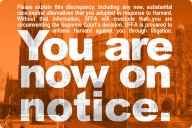You have /5 articles left.
Sign up for a free account or log in.

iStock
Most Americans see value in American higher education, according to a survey being released today by WGBH, Boston's public radio station. But the survey of 1,000 adults found a disconnect between the views of most Americans and of higher education leaders about the right of colleges to consider race in admissions.
The survey included a series of questions about admissions policies and diversity.
The survey found that the public supports the idea behind "holistic" admissions (although that term was not used in the survey). Only 27 percent of the public said that college admissions decisions should be based exclusively on high school grades and standardized test scores. Seventy percent said that admissions decisions should be based on a "variety of factors."
Further, 64 percent said it was extremely or very important that colleges have racial diversity in their student bodies. Another 22 percent said it was somewhat important.
But the results were striking when members of the public were asked if it was appropriate for colleges to consider certain factors in admissions decisions:
- 60 percent said that athletic talent should be considered.
- 72 percent said that musical talent should be considered.
- 73 percent said that leadership should be considered.
- 83 percent said that "overcoming hardships such as poverty or health problems" should be considered.
But then came the question on race. "The Supreme Court has decided colleges can use race as one factor in deciding which applicants to admit. Do you agree or disagree with this ruling?" Twenty-four percent said they agreed while 72 percent disagreed.
While opposition to consideration of race was strong, there were some differences of opinion by educational attainment and party affiliation.
College graduates were more than twice as likely as non-college graduates (40 percent vs. 17 percent) to agree with the Supreme Court that colleges should be allowed to consider race and ethnicity. The only group WGBH identified in which more supported than opposed the Supreme Court ruling was among those with graduate education, where backing for the ruling outpaced opposition 49 percent to 45 percent.
Defenders of affirmative action have noted that certain words in questions in surveys tend to yield more opposition, but the phrasing of this survey did not use those phrases (notably those with the word "preferences").
The results are in some ways similar to the findings of a 2016 survey of the public by Gallup (with questions drafted by Inside Higher Ed, which works with Gallup on surveys, but played no role in the survey referenced at the top of this article). In that survey, 61 percent of the public said that family economic circumstances should be a factor in admissions, 55 percent said that athletic ability should be a factor, and only 36 percent said that race or ethnicity should be a factor.
The Public on What Should Be Considered in Admissions, 2016
| Major Factor | Minor Factor | Not at All | No Opinion | |
| High school grades | 73% | 20% | 6% | 1% |
| Standardized test scores | 55% | 33% | 10% | 2% |
| Types of courses students took in high school | 50% | 31% | 19% | 1% |
| Family's economic circumstances | 31% | 30% | 39% | 1% |
| First-generation status | 31% | 27% | 41% | 1% |
| Athletic ability | 15% | 40% | 44% | 1% |
| Parent is a graduate | 11% | 35% | 52% | 2% |
| Race or ethnicity | 9% | 27% | 63% | 1% |
| Gender | 8% | 25% | 66% | 2% |
The WGBH survey comes at what could be a crucial time for affirmative action.
The retirement of Supreme Court Justice Anthony M. Kennedy may remove a vote that has provided support for the right of colleges (under certain conditions) to consider race in admissions.
Many who defend race-based affirmative action in college admissions have noted that Judge Brett Kavanaugh, President Trump's nominee to replace Kennedy, has not ruled on cases about colleges' admissions policies.
In written answers he provided to senators considering his nomination, Kavanaugh declined to discuss his views on the issue.
He was asked about his work for President George W. Bush, who opposed the University of Michigan's policies to consider race in admissions, and whether he supported "only race-neutral" efforts. Kavanaugh's answer: "As a lawyer in the White House, any views I expressed would have been in keeping with trying to advance President Bush’s legal and policy agenda. As a judge and a nominee, your question implicates issues that remain in dispute and that may come before me as a judge. As I discussed at the hearing, and in keeping with nominee precedent, it would be improper for me as a sitting judge and a nominee to comment on cases or issues that might come before me."
Kavanaugh was also asked why, given his pride in hiring female and minority law clerks, he has not affirmed the right of colleges to consider race and gender in admissions. His answer: "I am proud of my record of hiring the best to serve as my law clerks -- including women and minorities -- and of my efforts to promote diversity. The extent to which public universities may consider certain factors as admissions criteria is the subject of precedent and ongoing litigation. As I discussed at the hearing, and in keeping with nominee precedent, it would be improper for me as a sitting judge and a nominee to comment on cases or issues that might come before me."
The American Council on Education wrote to Senate leaders urging them to press Kavanaugh on his views on these subjects.








